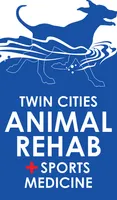Research Studies
Clinical research is critical to advancing the long-term health of our pets. At Twin Cities Rehab and Sports Medicine we are actively involved in research that supports the advancement of physical rehabilitation and overall wellness in our pets. Below you can find information regarding our current and past clinical research.
Current:
2021 Canine Research Study:
Evaluation of biceps muscles in Retrievers while carrying dummies: Biceps injuries and lameness caused by biceps strains are common in hunting dogs. These injuries can cause lameness, discomfort, and time off the field. The results from this study will be helpful in future planning for strengthening programs to prevent biceps injuries. We are looking at the biceps and surrounding shoulder muscles to evaluate the force and activation of these muscles when dogs carry birds or dummies. Contact [email protected] for more details and if you would like to participate. This study is funded by a grant from Purina.
Completed:
A common knee surgery for cruciate (ACL) tears in dogs is the TPLO. We looked at muscle function in dogs with cruciate tears, how that function changed after TPLO, and whether rehabilitation changed function further. We did this using acoustic myography, in which flat sensors are put on a dog’s skin over a muscle and those sensors detect the sound (intensity) of muscle contractions. We looked at four muscles in the rear legs, comparing the affected leg with the opposite rear leg. We found no differences in our muscle readings for the quadriceps and hamstrings throughout the time studied, but we did find a change in the gastrocnemius (calf muscle) and biceps femoris (outer thigh muscle) over time. The gastrocnemius muscle appeared to fully recover by 8 weeks, the biceps femoris did not. Rehabilitation in our clinic improved muscle size when compared to at-home rehabilitation. This information will spark more studies about muscle function in dogs after knee surgery and how we can further improve recovery. Accepted for publication. In press: comparative exercise physiology. This study was funded by grants from the Canine Rehabilitation Institute and Arthrex.
Long term use of Adequan injections in dogs: Adequan is polysulfated glycosaminoglycan, a slow-acting disease-slowing agent used to treat arthritis. We surveyed clients at this clinic about any adverse events identified when using Adequan. The study found that Adequan is well tolerated in most dogs, with primarily mild, self-resolving adverse events (stomach upset, loose stool, pain at injection site, brief stress during injection) which did not lead to discontinuation of treatment. Currently in press at Journal of the American Animal Hospital Association.
Return to sport after injury in agility dogs: We conducted a survey of 427 dogs around the world looking at how well they returned to sport after injury. We found that 67.4% of dogs returned to competition post-orthopedic injury but jump height (class) was decreased in just under half of those dogs. Dogs were able to return to competition after knee surgery, but were the least likely of all injury types to return to competition and were more likely to compete at a lower class. This information helps to further knowledge on how reconditioning after surgery should be changed. https://pubmed.ncbi.nlm.nih.gov/30347413/
The use of a brace for carpal (wrist) collateral ligament sprains in sporting dogs was found to be an effective treatment. Ninety one percent of dogs treated this way returned to agility competition successfully. https://pubmed.ncbi.nlm.nih.gov/24479458/
A collaborative study reviewed current science and collected expert opinion from a panel (including Dr Tomlinson) to establish a comprehensive definition of healthy aging in dogs. The two scientific papers written by this panel outlined the normal aging process in dogs and separated changes that are part of natural aging from abnormal disease processes. These papers guide clinicians in managing changes associated with increasing age. https://pubmed.ncbi.nlm.nih.gov/25517329/ and https://pubmed.ncbi.nlm.nih.gov/25517328/

